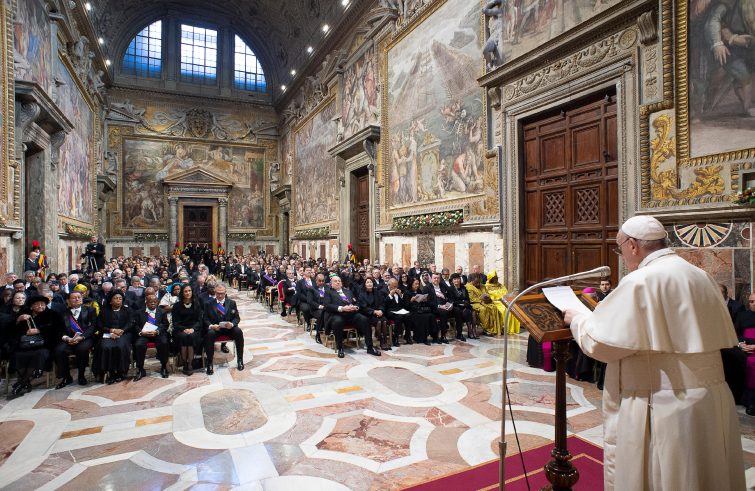
“Particularly troubling are the signals coming from the entire region following the heightening of tensions between Iran and the United States, which risk above all compromising the gradual process of rebuilding in Iraq, as well as setting the groundwork for a vaster conflict that all of us would want to avert.” With these words the Pope, in his seventh speech to the Diplomatic Corps, addressed the geopolitical situation at a most pressing moment, reiterating last Sunday’s appeal at the Angelus Prayer “that all the interested parties avoid an escalation of the conflict and keep alive the flame of dialogue and self-restraint, in full respect of international law.”
“The new year does not seem to be marked by encouraging signs, as much as by heightened tensions and acts of violence”, is the first snapshot of the speech, a traditional occurrence at the opening of the New Year for a geopolitical overview of the most pressing global issues. Young people, abuse, environment, dialogue, nuclear disarmament, and migration were among the main themes of the speech – which lasted about 50 minutes – that Francis comprehensively addressed, ideally retracing the stages of the international journeys he made in 2019. In addition to the conflicts in Syria, Libya, the Middle East and Latin America, the Pope delved into the situation in Europe and Africa. Finally, a special wish to the Italian people – on the occasion of the 500th anniversary of Raffaello Sanzio’s death – and to women, 25 years after the World Conference in Beijing. On 14 May next –Francis announced – a worldwide event will take place with the theme: “Reinventing the Global Compact on Education.”
Abuse, young people and the environment. Abuse was the first theme tackled by the Pope, with the renewed commitment of the Holy See “to bring to light abuses already committed” and “to ensure the protection of minors”. We must learn from the many young people that “have become active in calling the attention of political leaders to the issue of climate change”, commended the Pope. The need for an “ecological conversion” is acknowledged by young people but “it seems not to have been grasped by international politics, where the response to the problems raised by global issues such as climate change remains very weak and a source of grave concern”, as seen on the occasion of the COP 25 in Madrid December last. These issues were discussed during the recent Synod on the Pan-Amazon region.
Dialogue, peace and migrations. “It is particularly important to train future generations in interreligious dialogue,” Francis recommended in the wake of the Document on Human Fraternity signed in Abu Dhabi. As for Jerusalem and the Middle East the Pope expressed the hope that the whole international community shall “reconfirm, with courage and sincerity, and in respect for international law, its commitment to support the Israeli-Palestinian peace process.” Shatter “the pall of silence that risks falling over the war that has devastated Syria over the course of the last decade”, is the other appeal of the Holy Father, alongside with the plea to “find lasting solutions” for the Mediterranean Sea that continues to be a “vast cemetery.”Libya is one of many humanitarian crises, which, the Pope said, “provides fertile terrain for the scourge of exploitation and human trafficking, carried out by unscrupulous persons who exploit the poverty and suffering of those fleeing situations of conflict or of extreme poverty.” Among the latter, “many fall prey to genuinely criminal organizations that imprison them in inhumane and degrading conditions and subject them to torture, sexual violence and forms of extortion.”
Europe. Resolve the “frozen conflicts that persist” in Europe. Is the imperative for our continent, which, since the end of WWII has demonstrated that “Dialogue – not arms – is the essential way to resolve disputes.”
“Europe ought not to lose that sense of solidarity that has for centuries set it apart, even at the most difficult moments of its history. May it not lose that spirit, which finds its roots, among other things, in the Roman pietas and the Christian caritas that have shaped the spirit of the European peoples.”
Two incidents of the past year were mentioned by the Pope: the fire at Notre Dame Cathedral in Paris, that “revived the question of Europe’s historical and cultural values, and its deeper roots”, and “the thirtieth anniversary of the fall of the Berlin Wall, which “remains emblematic of a culture of division that alienates people from one another and opens the way to extremism and violence”, Francis denounced along with “hate speech widespread on the internet and in the social communications media.”
Africa, Japan, and Australia. “Signs of peace and reconciliation” in Mozambique, Madagascar e Mauritius, “episodes of violence against innocent people, including many Christians persecuted and killed for their fidelity to the Gospel”. It’s the contrasting portrait of Africa, an occasion to “urge the international community to support the efforts made by these countries to eliminate the scourge of terrorism.” The Pope expressed the wish to visit South Sudan this year. A world “without nuclear weapons is possible and necessary”, Francis underlined in the wake of his visit to Japan. Francis assured his “closeness and prayers” also to the Australian people, direly hit by the wildfires.
Expressions of good wishes to Italy and to women. “The desire for peace, the pursuit of justice, respect for the dignity of the human person, humanitarian cooperation and assistance” are the “founding principles” of the United Nations that preserve their topical relevance upon the 75th anniversary of the UN Constitution. 500 years after the death of Raffaello Sanzio, Francesco offers his best wishes to the Italian people and, on the 25th of the IV World Conference of the United Nations in Beijing, he extends “a special thought to all women.”










